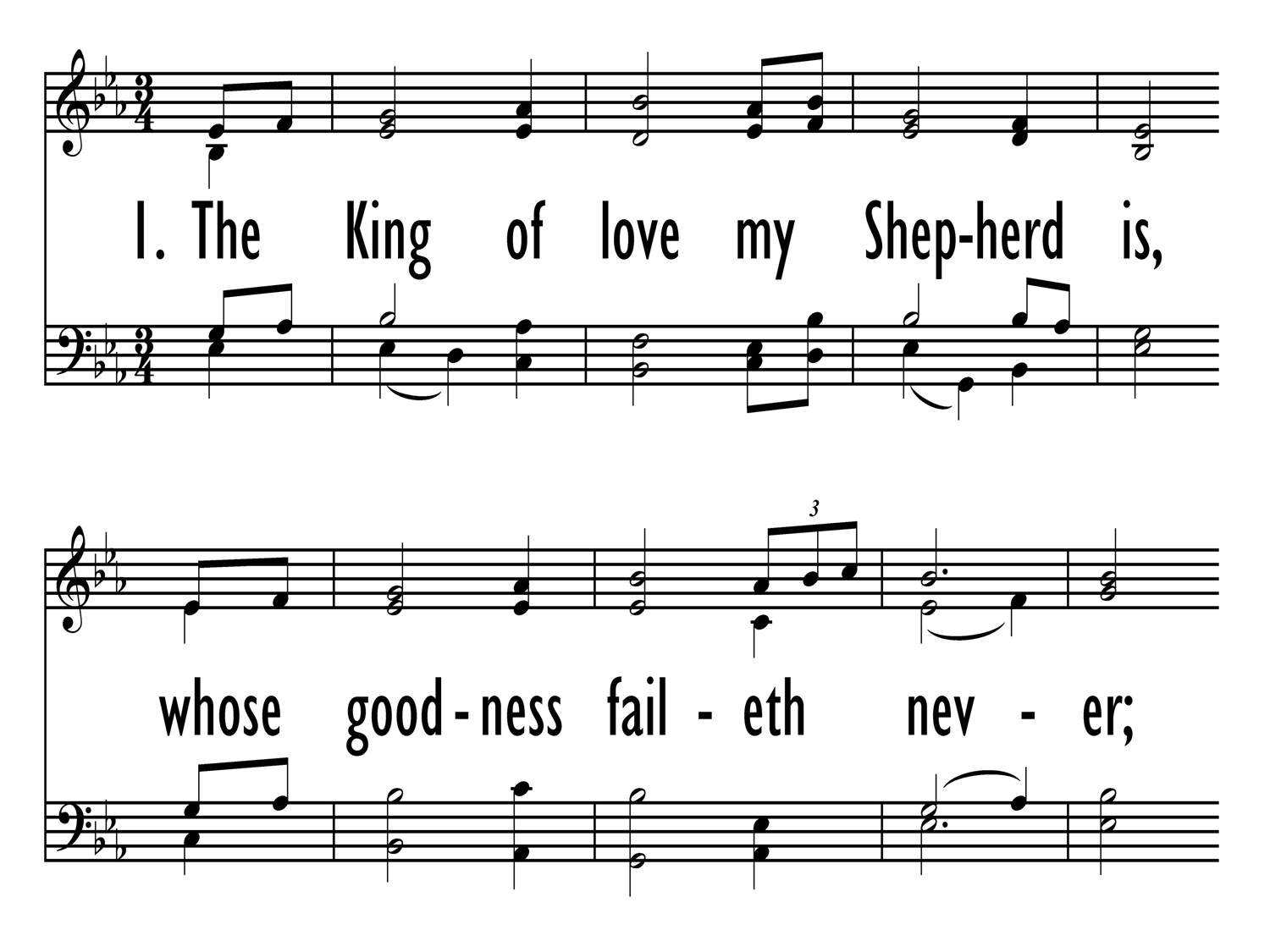- |
User Links
The King of Love My Shepherd Is

The King of love my Shepherd is
Author: H. W. Baker (1868)Tune: DOMINUS REGIT ME (Dykes)
Published in 677 hymnals
Printable scores: PDFPlayable presentation: Lyrics only, lyrics + musicAudio files: MIDI, Recording
Representative Text
1 The King of love my shepherd is,
whose goodness faileth never.
I nothing lack if I am his,
and he is mine forever.
2 Where streams of living water flow,
my ransomed soul he leadeth;
and where the verdant pastures grow,
with food celestial feedeth.
3 Perverse and foolish, oft I strayed,
but yet in love he sought me;
and on his shoulder gently laid,
and home, rejoicing, brought me.
4 In death's dark vale I fear no ill,
with thee, dear Lord, beside me;
thy rod and staff my comfort still,
thy cross before to guide me.
5 Thou spreadst a table in my sight;
thy unction grace bestoweth;
and oh, what transport of delight
from thy pure chalice floweth!
6 And so through all the length of days,
thy goodness faileth never;
Good Shepherd, may I sing thy praise
within thy house forever.
United Methodist Hymnal, 1989
Author: H. W. Baker
 Baker, Sir Henry Williams, Bart., eldest son of Admiral Sir Henry Loraine Baker, born in London, May 27, 1821, and educated at Trinity College, Cambridge, where he graduated, B.A. 1844, M.A. 1847. Taking Holy Orders in 1844, he became, in 1851, Vicar of Monkland, Herefordshire. This benefice he held to his death, on Monday, Feb. 12, 1877. He succeeded to the Baronetcy in 1851. Sir Henry's name is intimately associated with hymnody. One of his earliest compositions was the very beautiful hymn, "Oh! what if we are Christ's," which he contributed to Murray's Hymnal for the Use of the English Church, 1852. His hymns, including metrical litanies and translations, number in the revised edition of Hymns Ancient & Modern, 33 in all. These were cont… Go to person page >
Baker, Sir Henry Williams, Bart., eldest son of Admiral Sir Henry Loraine Baker, born in London, May 27, 1821, and educated at Trinity College, Cambridge, where he graduated, B.A. 1844, M.A. 1847. Taking Holy Orders in 1844, he became, in 1851, Vicar of Monkland, Herefordshire. This benefice he held to his death, on Monday, Feb. 12, 1877. He succeeded to the Baronetcy in 1851. Sir Henry's name is intimately associated with hymnody. One of his earliest compositions was the very beautiful hymn, "Oh! what if we are Christ's," which he contributed to Murray's Hymnal for the Use of the English Church, 1852. His hymns, including metrical litanies and translations, number in the revised edition of Hymns Ancient & Modern, 33 in all. These were cont… Go to person page >Text Information
Related Texts
| First Line: | The King of love my Shepherd is |
| Title: | The King of Love My Shepherd Is |
| Author: | H. W. Baker (1868) |
| Meter: | 8.7.8.7 |
| Place of Origin: | England |
| Language: | English |
| Notes: | Spanish translation: See "El Rey de amor es me Pastor" by Frieda M. Hoh; Swahili translation: See "Mfalme wa upendo ndiye" |
| Copyright: | Public Domain |
Chinese
English
- A Hymnal and Service Book for Sunday Schools, Day Schools, Guilds, Brotherhoods, etc. #369
- A Manual of Worship: for the chapel of Girard College #197
- A Missionary Hymn Book #126
- A School Service Book #d163
- A Selection of Hymns #d67
- A Selection of Spiritual Songs: with music, for the Sunday-school #120
- A Service Hymn Book #d141
- A Treasury of Hymns: The best-loved hymns, carols, anthems, children's hymns, and gospel songs #166
- Alexander's Hymns No. 4 #17
- All Hail #d15 10 shown out of 505
French Creole
Spanish
For Leaders
Text:
Henry Baker, editor-in-chief of Hymns Ancient and Modern, wrote this text based on Psalm 23, and it appeared in the appendix of that hymnal in 1868. The text of this hymn has remained very stable. The fifth stanza is omitted from some hymnals, perhaps because this stanza contains more archaic expressions than any of the others. Most hymnals do not modernize the language. The six stanzas of this hymn correlate closely to the six verses of the twenty-third Psalm, while drawing connections between this well-known Old Testament passage and several New Testament images, all on the theme of the Good Shepherd. In the first two stanzas, the connections are subtle. In stanza 1, Baker adds a comment on the two-way, eternal nature of the relationship between the shepherd and the sheep, referring to Jesus' words in John 10:28. By changing the words “still waters” to “streams of living water,” Baker recalls Jesus' declaration that He is the source of these streams (John 4:14, 7:37-39). Stanza 3 clearly refers to the Parable of the Lost Sheep (Luke 15:3-7). In the second half of the hymn, the connection between Old and New Testaments is more pronounced by the use of the words “cross” (st. 4), “chalice” (st. 5, referring to the cup in the Lord's Supper), and “Good Shepherd” (st. 6).
Tune:
There are two tunes with which this text is frequently associated: DOMINUS REGIT ME, and ST COLUMBA. DOMINUS REGIT ME is the opening phrase of Psalm 23 in Latin. John B. Dykes wrote this tune for this hymn in 1868. The editors of the English Hymnal were unable to use this tune due to copyright issues, so they adapted ST. COLUMBA, an Irish hymn tune. Both choices are quite popular. DOMINUS REGIT ME appears in more hymnals, but ST. COLUMBA is more popular with arrangers.
When/Why/How:
Obviously, this hymn can be used for a service based on texts such as Psalm 23 or John 10, or a service with the theme of Christ the Good Shepherd. Paul Westermeyer suggests that this hymn is also appropriate for the Lord's Supper, because of the references in the fifth stanza to “thy pure chalice” on the table set for us by the Lord (Hymnal Companion to Evangelical Lutheran Worship, 332). ST COLUMBA is the more preferred tune of the two for arrangements. This hymn is fairly popular as a theme for organ preludes. “The Lord Is My Shepherd: Six Hymn Settings on Psalm 23” includes organ settings by Wilbur Held of both DOMINUS REGIT ME and ST COLUMBA. Harold Friedell has composed a grander setting, titled “Prelude on St. Columba”. “Good Shepherd, You Are Ever Near” is a choral arrangement by Carolyn Jennings using the tune ST COLUMBA and a slightly altered text.
Tiffany Shomsky, Hymnary.org
Timeline
Arrangements
Media
- MIDI file from The Cyber Hymnal #3532
- Audio recording from Evangelical Lutheran Worship #502
- Audio recording from Glory to God: the Presbyterian Hymnal #802
- MIDI file from The Glad Refrain for the Sunday School: a new collection of songs for worship #99
- MIDI file from The Helper in Sacred Song: for Sunday-schools, churches, and devotional services #103
- Audio recording from Lift Up Your Hearts: psalms, hymns, and spiritual songs #824
- Audio recording from Lift Up Your Hearts: psalms, hymns, and spiritual songs #824
- Audio recording from The New Century Hymnal #248
- Audio recording from Psalms for All Seasons: a complete Psalter for worship #23D
- Audio recording from Small Church Music #267
- Audio recording from Small Church Music #267
- Audio recording from Trinity Hymnal (Rev. ed.) #184
- MIDI file from The United Methodist Hymnal #138
- Audio recording from The United Methodist Hymnal #138
- Audio recording from Worship (4th ed.) #712


 My Starred Hymns
My Starred Hymns







